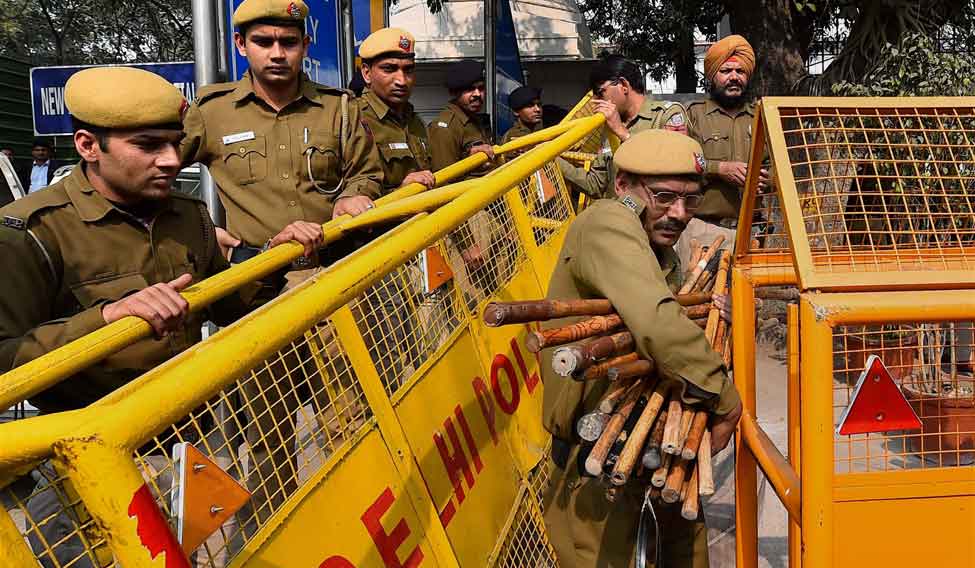The Supreme Court on Wednesday said that it will be Delhi Police Commissioner B.S. Bassi's personal responsibility to ensure safety of JNU Students Union president Kanhaiya Kumar, as it was told that he was badly beaten up while being brought to the court premises in police custody earlier in the day.
A bench of Justice J.Chelameswar and Justice Abhay Manohar Sapre also said it would be police's responsibility to ensure that besides Kanhaiya Kumar, all those who attended the court proceedings in pursuance of its morning order leave the premises in safety.
The order came after it was told by senior counsel Ajit Kumar Sinha, appearing for Delhi Police, that Bassi has told him that he takes personal responsibility for Kanhaiya Kumar's safety
Sinha had taken instructions inside the court room from the police commissioner on his mobile phone on the directions of the court, which asked if Bassi can guarantee safety and security of Kanhaiya Kumar who has been arrested on charges of sedition.
The court had said that the security of Kanhaiya Kumar and those present in the court room should be 100 percent fool proof, indicating that if Delhi Police can't do it, then it may seek other options. It had been suggested that the security be handed over to the Central Reserve Police Force.
Senior counsel Raju Ramachandran, who is one of the six lawyers in the legal team defending Kanhaiya Kumar, sought court's order for his safety even in jail premises during his 14 days judicial remand granted by a magistrate on Wednesday.
The court had adjourned the hearing till 2 pm to let a team of lawyers to submit their report about their assessment of the situation prevailing in the Patiala House court complex when they visited it on its post-lunch direction.
Senior counsel Harin Rawal, who would compile the report, would also submit a copy of the video recording of all that transpired in Patiala House Court complex during their visit.
The court also sought a report from the Delhi High Court's registrar general who too was present in the court of the metropolitan magistrate on its instructions, as it gave Delhi Police till Friday morning to submit its report and directed the next hearing of the matter on Monday.
The court order came as team of six senior apex court lawyers that was sent to Patiala House Court to observe the situation there said they witnessed an "unprecedented" situation with an atmosphere of "fear and terrorising people".
Besides Rawal and Sinha, the team also comprised Kapil Sibal, Rajeev Dhawan, Dushyant Dave, and A.G.N. Rao.
Dhawan told the court that the "collective view of the team is that police did not do their job".
He told the court they were not only abused in the filthiest language but were described as Pakistani agents. "We were called Pakistan ke dalle," he said, adding that not only was the police cordon around them broken, but gravel, and flower pots hurled at them along with abuse.
He said Kanhaiya Kumar was "badly beaten" and doctors on the request of his lawyers were attending him, and also told the court that a gentleman wearing dark glasses entered the court room, thumped Kanhaiya Kumar and sat beside him.
Even though the registrar general asked police to stop him and arrest him as his presence in the court room was in breach of the apex court order, police allowed him to go.
Dhawan told the court that even though the deputy commissioner of police present on the spot was aware of the court's order, but still the person was allowed to move in and out without his identification being checked.
Taking note of JNU students and journalists being assaulted with the court complex on February 15, the apex court had regulated the entry in the court room where Kanhaiya Kumar was to be produced, saying that besides his six lawyers, the prosecution, Kanhaiya Kumar's relatives and five journalists only will be permitted.
In the absence of relatives, two people—one from JNU faculty and one from the student fraternity—would be allowed to enter.
It had also allowed the presence of 25 other journalists in the Patiala House Court complex.










